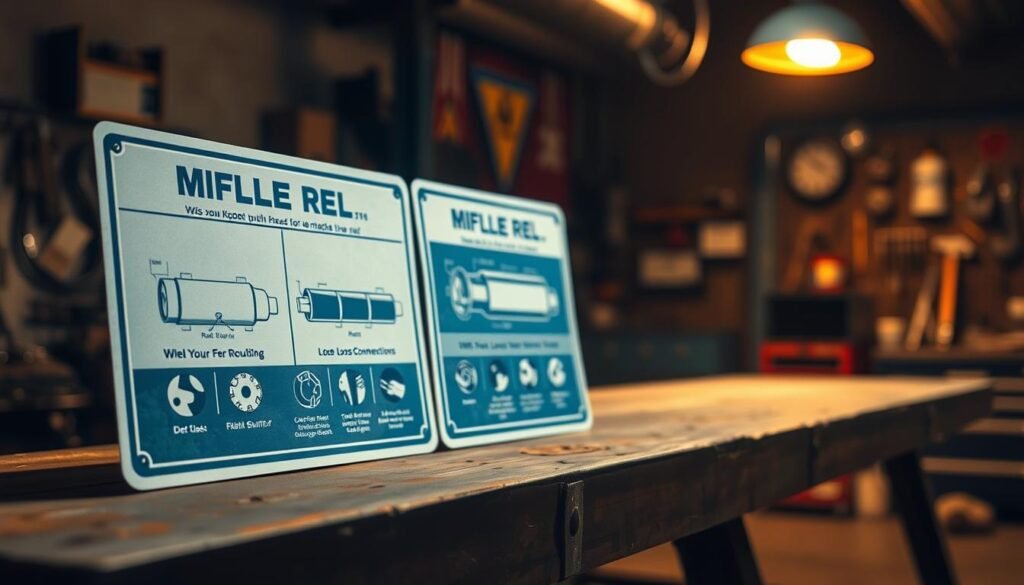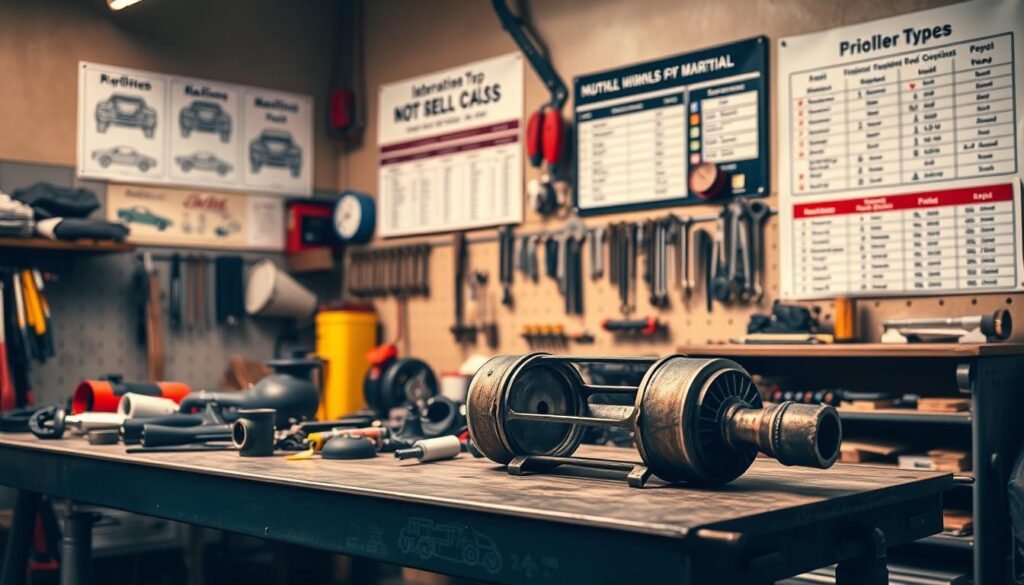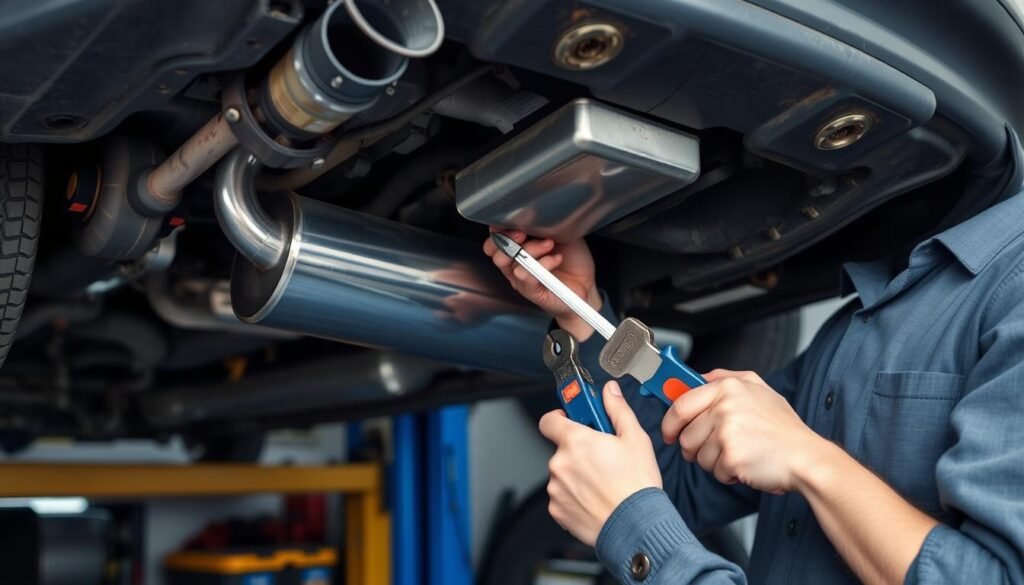Is your vehicle making more noise than usual? A faulty muffler could be the culprit. The muffler is a critical component of your exhaust system, responsible for reducing the noise emitted by your car‘s engine.
Understanding the cost of muffler repairs is essential for vehicle owners. Repairs can range from simple fixes to complete replacement of the muffler or other parts of the exhaust system. The average cost for installing a mid-range muffler replacement on a typical sedan is between $150 and $250, including parts and labor.
This guide will walk you through the factors affecting muffler repair cost, ways to save money, and the importance of timely repairs for your vehicle‘s safety, performance, and fuel efficiency.
Key Takeaways
- Average cost for a mid-range muffler replacement is between $150 and $250.
- Muffler repairs can range from simple fixes to complete replacements.
- Timely repairs are crucial for vehicle safety, performance, and fuel efficiency.
- Understanding the factors affecting muffler repair costs can help you save money.
- Choosing the right repair shop is essential for quality service.
Understanding Your Vehicle’s Muffler System
Understanding the basics of your vehicle’s muffler system can help you identify potential issues before they become major problems. The exhaust system, which includes the muffler, plays a crucial role in diverting fumes away from the engine and passenger compartment, ensuring your vehicle runs smoothly and safely.
What Is a Muffler and How Does It Work?
A muffler is a key component of your vehicle’s exhaust system, designed to reduce the noise produced by the engine’s exhaust gases. It works by using a series of chambers and baffles to dissipate the energy of the gases, resulting in a quieter exhaust note. The muffler also helps to reduce the emissions of harmful pollutants into the environment.
The Importance of a Properly Functioning Exhaust System
A properly functioning exhaust system is vital for maintaining your vehicle’s performance and longevity. It helps to divert harmful exhaust gases away from the engine and passenger compartment, reducing the risk of engine damage and health problems. A well-maintained exhaust system also contributes to better fuel efficiency and reduced emissions, making it an essential aspect of vehicle maintenance.
Regular inspection of the exhaust system can help prevent more serious engine problems and safety issues. By ensuring your exhaust system is in good condition, you can enjoy a smoother, quieter ride, and reduce the risk of costly repairs down the line.
Signs Your Muffler Needs Repair
Identifying the signs that your muffler needs repair can save you from more costly problems down the line. Your muffler is a critical component of your vehicle’s exhaust system, playing a key role in reducing noise and improving performance.
Increased Noise and Unusual Sounds
One of the most obvious signs that your muffler needs repair is an increase in noise or unusual sounds coming from your car. If your muffler is damaged or worn out, it can no longer effectively dampen the sound of your engine, leading to a louder than usual exhaust note.

Vibrations and Performance Issues
A faulty muffler can also cause vibrations and performance issues with your vehicle. If you notice that your car is vibrating more than usual or is not performing as well as it should, it could be a sign of a problem with your exhaust system.
Decreased Fuel Efficiency
A decrease in fuel efficiency can also indicate a problem with your muffler or exhaust system. Exhaust leaks, for example, can cause your engine to work harder, using more fuel and decreasing your overall fuel efficiency.
| Signs | Description | Possible Cause |
|---|---|---|
| Increased Noise | Louder exhaust sound | Damaged or worn-out muffler |
| Vibrations | Unusual vibrations while driving | Faulty muffler or exhaust system |
| Decreased Fuel Efficiency | Drop in fuel mileage | Exhaust leaks or backpressure issues |
If you notice any of these signs, it’s essential to take your vehicle to a local service center for an inspection. Ignoring these issues can lead to more severe problems and increased costs in the long run.
How Much Does It Cost to Fix a Muffler?

Understanding the costs associated with muffler repair is crucial for budgeting and making informed decisions about your vehicle’s maintenance. The cost to fix a muffler can vary significantly based on several factors, including the type of vehicle you own and the extent of the damage to the muffler or the exhaust system.
Average Muffler Replacement Costs
The average cost to replace a muffler can range widely, depending on whether you need a minor repair or a full replacement. On average, you can expect to pay between $100 and $500 for a new muffler, including labor costs. The cost of the muffler itself can vary based on the material and quality, with aftermarket parts often being less expensive than OEM (Original Equipment Manufacturer) parts.
For instance, a basic aftermarket muffler might cost around $50 to $100, while a high-performance OEM muffler could cost upwards of $200 to $400. Labor costs also play a significant role, as the complexity of the job and the rates charged by the repair shop can affect the final bill.
Minor Repair Costs vs. Full Replacement
In some cases, a muffler might not need to be fully replaced; a minor repair could suffice. Minor repairs might involve fixing a leak or replacing a damaged section of the exhaust pipe. These repairs can be more cost-effective, with costs ranging from $50 to $200, depending on the nature of the repair and the labor rates.
However, if the muffler is severely damaged or has been compromised by rust or corrosion, a full replacement is usually the more cost-effective option in the long run. When considering the cost of repairs versus replacement, it’s essential to factor in the potential for future issues if the muffler is not fully replaced.
Additional Exhaust System Repair Expenses
When repairing or replacing a muffler, other components of the exhaust system may also require attention. If the resonator or exhaust pipe is damaged, this can add $100 to $150 to the cost of repairs. An exhaust tip replacement can add another $25 to $50.
Driving in harsh weather conditions can lead to additional damage to the exhaust system, necessitating the replacement of parts like gaskets, hangers, and silencers. These parts can add $20 or more to the overall cost. In severe cases, if the catalytic converter is damaged, the total repair cost can escalate to $1,000 or more.
A comprehensive inspection is crucial to identify all necessary repairs and avoid unexpected expenses down the road. By understanding the potential additional costs associated with muffler repair, you can better plan and budget for the maintenance of your vehicle’s exhaust system.
Factors That Affect Muffler Repair Pricing
Muffler repair pricing is not a one-size-fits-all solution; it’s affected by various elements. The cost can fluctuate based on several key considerations that you should be aware of to make informed decisions about your vehicle’s maintenance.
Vehicle Make and Model Considerations
The make and model of your vehicle play a significant role in determining muffler repair costs. Luxury or high-performance vehicles often require specialized parts that are more expensive than those for standard models. Additionally, some vehicles have more complex exhaust systems, which can increase labor costs. For instance, a muffler replacement for a high-end sports car may cost more than for a typical sedan due to the unique design and materials used.
Repair Shop Selection: Dealership vs. Independent Shops
Choosing between a dealership and an independent repair shop can also impact your muffler repair costs. Dealerships typically charge more for labor and may use OEM parts, which can be more expensive. Independent shops, on the other hand, may offer more competitive pricing and the option to use aftermarket parts. However, the quality of service and parts can vary significantly between shops. It’s essential to research and compare prices to find a reliable and affordable option.

OEM vs. Aftermarket Parts
The choice between OEM and aftermarket parts is another critical factor affecting muffler repair pricing. OEM mufflers are generally more expensive but are designed to meet the manufacturer’s specifications, ensuring a precise fit and optimal performance. Aftermarket parts, while often cheaper, can vary in quality. Some high-end aftermarket mufflers offer improved performance, but inferior-grade options may lead to more frequent replacements. On average, mufflers last around 10 years, but their lifespan can range from 5 to 15 years depending on various factors, including exposure to harsh weather conditions.
When deciding between OEM and aftermarket parts, consider your budget, the age of your vehicle, and your performance expectations. While OEM parts may be more costly upfront, they can provide better longevity and performance. In contrast, aftermarket parts can be a cost-effective solution but may require more frequent replacements.
When to Replace Your Muffler
Knowing when to replace your muffler can save you from potential safety hazards and costly repairs down the line. Your muffler plays a critical role in your vehicle’s exhaust system, and its failure can lead to various issues.
Safety Concerns with Damaged Mufflers
A damaged muffler can pose significant safety risks. If your muffler is clogged or has developed holes, it can lead to the leakage of exhaust gases. These gases contain carbon monoxide, a colorless and odorless gas that can be lethal in enclosed spaces. Moreover, a faulty muffler can cause your vehicle to fail emissions tests, contributing to environmental pollution. It’s crucial to address muffler issues promptly to ensure your safety and the safety of others.
Average Lifespan of Mufflers
The average lifespan of a muffler varies significantly based on several factors, including environmental conditions and driving habits. Typically, a muffler can last between 5 to 15 years. On average, most mufflers last around 10 years. However, exposure to harsh weather conditions, such as rain, snow, and salt, can reduce its lifespan. An inferior-grade aftermarket muffler may only last about three years under such conditions.
- Environmental factors like rain, snow, and salt can affect muffler longevity.
- Driving habits and conditions, such as frequent stop-and-go traffic, can also impact its lifespan.
- Signs like increased noise, vibrations, and decreased fuel efficiency indicate a muffler is nearing the end of its life.
DIY Muffler Replacement Guide

A DIY muffler replacement is feasible for those familiar with their vehicle’s exhaust system. This guide will walk you through the necessary tools, steps, and safety precautions to successfully replace your muffler.
Tools and Materials Needed
To replace your muffler, you’ll need a few basic tools and materials. These include a socket wrench set, a hacksaw or reciprocating saw, a new muffler compatible with your vehicle’s make and model, and exhaust hangers or clamps as required. Ensure you have all the necessary parts before starting the repair to avoid delays.
Step-by-Step Replacement Process
Begin by allowing your vehicle’s exhaust system to cool completely to avoid burns. Then, raise your vehicle using a jack and support it with jack stands for safety. Remove the exhaust hangers or clamps holding the old muffler in place, and carefully take out the muffler. Install the new muffler, ensuring it’s properly aligned and secured with the hangers or clamps. Finally, start your engine to check for any leaks or unusual sounds.
Safety Precautions for DIY Repairs
Safety first is crucial when working with exhaust systems. Always wear eye protection and gloves. Ensure your vehicle is on level ground and supported by jack stands. Be aware of the dangers of carbon monoxide poisoning and avoid working in enclosed spaces without proper ventilation. If welding is required, consider hiring a professional to avoid potential hazards.
Finding the Right Muffler Repair Shop
To ensure your vehicle runs smoothly, it’s vital to identify a competent muffler repair service. When you suspect an exhaust problem, the best course of action is to book an appointment at a muffler shop for afree inspection. This initial step helps determine the extent of the problem, which may be as simple as replacing a worn or missing gasket.
When selecting a repair shop, consider factors such as their ability to handle completeexhaust systems, includingcatalytic convertersandtailpipes. It’s also beneficial to compare chain muffler shops like Meineke or Monro with independent repair facilities. While chain shops may offer cheaper services due to their buying power and often stand behind their work, independent shops can provide personalized service.
To get the best service and price for muffler repairs, ask questions when getting quotes, such as what is included in the repair or replacement, and what kind of warranty they offer. Verifying that all necessary work was completed properly is also crucial. By doing your research and choosing a reputable shop, you can ensure that your vehicle’s exhaust system is in good hands.
FAQ
What are the signs that my muffler needs to be replaced?
If you notice increased noise, unusual sounds, vibrations, or a decrease in fuel efficiency, your muffler may need to be replaced. Inspect your vehicle’s exhaust system for damage or rust.
Can I replace my muffler myself?
Yes, you can replace your muffler yourself if you have the necessary tools and follow proper safety precautions. However, if you’re not comfortable with DIY repairs, consider consulting a professional mechanic.
What is the average lifespan of a muffler?
The average lifespan of a muffler is around 5-7 years, depending on your vehicle’s make, model, and driving conditions. Regular inspections can help identify potential issues before they become major problems.
Are aftermarket mufflers a good option?
Aftermarket mufflers can be a good option if you’re looking for improved performance or a different sound. However, ensure that the aftermarket muffler meets your local emissions regulations and is compatible with your vehicle’s exhaust system.
Can a damaged muffler cause safety issues?
Yes, a damaged muffler can cause safety issues, such as increased noise, decreased visibility due to exhaust fumes entering the vehicle, and potentially even carbon monoxide poisoning. If you suspect your muffler is damaged, have it inspected and repaired promptly.
What factors affect the cost of muffler repair or replacement?
The cost of muffler repair or replacement is affected by factors such as your vehicle’s make and model, the type of repair or replacement needed, labor costs, and whether you choose OEM or aftermarket parts.
Should I choose a dealership or independent shop for muffler repair?
Both dealerships and independent shops can provide quality muffler repair services. Consider factors such as price, reputation, and warranty offered when deciding where to take your vehicle.